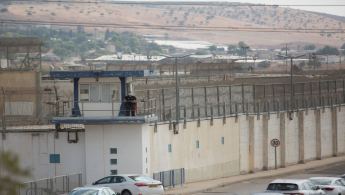Israel says last two Palestinian Gilboa prison break escapees recaptured
The Israeli army has recaptured the last two Palestinian escapees involved in a spectacular jail break earlier this month, it announced Sunday.
At the beginning of September, six Palestinian inmates escaped Gilboa prison in Israel's north, through a tunnel dug under a sink in a cell, reportedly using tools including a spoon.
Israel launched a massive manhunt, deploying drones, road checkpoints and pouring troops into the occupied West Bank.
Authorities had already arrested four of the six, and in a tweet on Sunday, said the last two had surrendered "after being surrounded by security forces that acted precisely based on accurate intelligence".
The men, 35-year-old Ayham Kamamji and 26-year-old Munadel Infeiat, are both members of Islamic Jihad, an armed Palestinian Islamist movement.
They were arrested in a joint operation with counterterrorism forces in Jenin, in the West Bank, the army said in a short statement to the press, adding that they were "currently being interrogated".
Originally from Kafr Dan, near Jenin, Kamamji was arrested in 2006 and jailed for life for the alleged kidnap and murder of an Israeli settler.
Islamic Jihad said Kamamji suffered abdominal and intestinal illness in jail and was subject to "medical negligence" by prison authorities.
Infeiat, arrested last year, had been jailed multiple times previously for his role in the armed group, and was awaiting sentencing at the time of the escape.
The other four men recaptured last week included Mahmoud Abdullah Ardah, the alleged mastermind of the escape, and Zakaria Zubeidi, a former militant leader of the Fatah movement.
Lawyers for two captured Palestinian jail-breakers have claimed that their clients have faced torture and abuse since being recaptured by Israeli police.
Mohammed Al-Arda has been beaten and tortured, according to his lawyer Khaled Mahajneh, the Palestinian Commission for Detainees and Ex-Detainees' Affairs (CDA) said.
Al-Arda has not been allowed to get more than 10 hours' sleep total since being detained again, and is confined to a small cell, the lawyer said.
The prisoner has even been refused food, having eaten for the first time just yesterday, Mahajneh alleged.
Mahajneh also claimed the escapee was injured all over his body while Israeli security pursued him, for which he has still not received treatment.
He was even physically assaulted during his recapture, Al Jazeera reported Mahajneh as alleging.
"You don’t deserve to live. You deserve for me to shoot you in the head," one investigator told Mohammed, his lawyer reported as saying by The New Arab's Arabic-language sister service, Al-Araby Al-Jadeed.
"The prisoner Mohammed Al-Arda rejects the accusations he is facing and remains silent despite all the torture and attempts to pressure him. He replied to the occupation's investigator that did not commit a crime," Mahajneh said.
"I went around the areas of Palestine occupied in 1948 [what's now considered Israel] and was looking for my freedom and to see my mother," Mohammed is said to have told the investigator.
Zakaria Al-Zubaidi, perhaps the highest-profile of the prison breakers, saw his lawyer, Avigdor Feldman, on Wednesday afternoon, according to the CDA.
As he was being recaptured, the ex-Al-Aqsa Martyrs Brigades local commander was allegedly assaulted, receiving two broken ribs plus a broken jaw.
He was taken to an Israeli hospital for his injuries but was treated solely with painkillers, the CDA quoted Feldman as saying.
"Zakaria Al-Zubaidi did not participate in the digging. He moved into the six prisoners' room one day before they left through the tunnel which took almost one year to dig," according to Feldman.
Feldman said his client had informed him that he and Al-Arda, who were found together, did not attempt to seek help from others so as not to get them into trouble with the Israeli authorities
Prisoner Mahmoud Al-Ardah, not to be confused with Al-Arda, met with his lawyer, Raslan Mahajneh.
Al-Ardah also said that the prisoners avoided going to parts of Israel inhabited by Palestinian citizens of the Jewish state "in order not to expose anyone to accountability" for their actions.






 Follow the Middle East's top stories in English at The New Arab on Google News
Follow the Middle East's top stories in English at The New Arab on Google News


